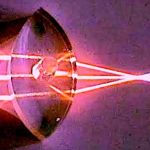This is an introductory course for students with limited background in chemistry; basic concepts involved in chemical reactions, stoichiometry, the periodic table, periodic trends, nomenclature, and chemical problem solving will be emphasized with the goal of preparing students for further study in chemistry as needed for many science, health, and policy professions. … [Read more...] about Introduction to Chemistry: Reactions and Ratios
Physical Science and Engineering
Physics 101 – Forces and Kinematics
This course serves as an introduction to the physics of force and motion. Upon completion, learners will have an understanding of how mathematical laws and conservation principles describe the motions and interactions of objects all around us. They will gain experience in solving physics problems with tools such as graphical analysis, algebra, vector analysis, and calculus. The … [Read more...] about Physics 101 – Forces and Kinematics
First Order Optical System Design
This course can also be taken for academic credit as ECEA 5600, part of CU Boulder’s Master of Science in Electrical Engineering degree. Optical instruments are how we see the world, from corrective eyewear to medical endoscopes to cell phone cameras to orbiting telescopes. When you finish this course, you will be able to design, to first order, such optical systems with … [Read more...] about First Order Optical System Design
Introduction to TCP/IP
You use the Internet through your PC (Personal Computer), laptop, tablet, smartpad, and smartphone every day in everything you do. Through your own PC/laptop, you can easily learn everything about the Internet, and that is what this course is focused on. In this course ‘Introduction to TCP/IP,’ you will learn the operational functions of Internet technologies (which … [Read more...] about Introduction to TCP/IP
Introduction to Complexity Science
This course explores the features of complexity science. Our world is connected by an abundance of complex systems. Across all levels of organizations from physical, biological world to the social world, we may think of the connectivity between individual elements and how they interact and influence each other. For example, how humans transmit pandemics within a group, how … [Read more...] about Introduction to Complexity Science






